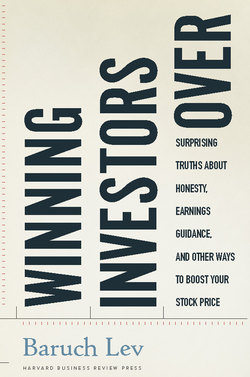Читать книгу Winning Investors Over - Baruch Lev - Страница 2
На сайте Литреса книга снята с продажи.
Introduction Why Restoring Investors’ Trust in Managers Is Now Critical
ОглавлениеCapital markets during the first decade of the twenty-first century were hostile territory for investors. From the debacles of Enron and World-Com early in the decade to the collapse of Bear Stearns, Lehman Brothers, and Countrywide Financial at its end, and from the vanished investments in dot-coms and high-techs in 2000 to the massive losses of funds sunk into stocks, subprime mortgages, and commercial real estate, equity investors suffered mightily. Many corporate managers meanwhile enjoyed ever-increasing, sometimes detached-from-performance compensation, some even abusing stock option grants and helping themselves to outrageous perks and golden parachutes, all enabled by complacent, often incompetent directors. Investors’ disillusionment, ire, and loss of trust in corporate leaders were the inevitable outcome. And a seriously costly outcome it is. Consider:
Investors’ discontent brought new costly regulations: first, after the stock market collapse of 2001 and 2002, the wide-reaching Sarbanes-Oxley Act and, later, after the 2007–2008 financial crisis, the Dodd-Frank Wall Street Reform and Consumer Protection Act, which reached far beyond the financial sector with its “say on pay” provision, enhancing regulators’ and shareholders’ reach at the expense of managers’.
Shareholders’ and boards’ increasing impatience is shrinking the tenure of top managers. Mean CEO tenure in the United States was cut by a quarter—from eight to six years—in just the last decade. And not only in the United States. In February 2010, SAP, the world’s third-largest software producer, broke the world record for speed-firing CEOs of major companies by ousting Léo Apotheker after just nine months at the helm as sole chief (not to worry, he landed at Hewlett-Packard).
The relentless drive for director independence—the cure du jour for governance ills—and the rising number of thumbs-down votes by shareholders at directors’ elections transformed many corporate boards from managers’ counselors and advisers into supervisors and monitors, and sometimes even into adversaries. Frank information sharing and competent advice in board meetings are the victims.
Sensing investors’ discontent and managers’ loss of power, hedge funds and other activists preyed on companies to gain board seats, deplete cash reserves, and change corporate strategies. Recently, even some long-dormant mutual funds joined the activists’ ranks.
The increasing number and success of shareholder proposals and proxy contests aimed at changing corporate bylaws, separating the CEO and board chair positions, curbing compensation, as well as enacting a slew of social and environmental provisions, obviously encroach on managers’ prerogatives and restrict their decision space.
All this—primarily the outcome of investors’ and the public’s loss of trust—impinge on the ability of managers to do their jobs. The power and stature of executives have declined during the past decade, as Marcel Kahan and Edward Rock, leading law professors, document in their recent and widely read paper, “Embattled CEOs.”1 While a certain shift of power from executives to corporate constituencies may be desirable, there is always the danger of the pendulum of change swinging too far. Perhaps it already has.
Regaining investors’ and the public’s confidence is the most critical issue facing corporate executives in the early twenty-first century. How else will they be able to secure investors’ and lenders’ backing for investments in growth (R&D, IT, brands), corporate restructurings, or strategic shifts? How else will they fend off disruptive activist investors and trial lawyers? For managers, it’s about protecting the core of their businesses—not to mention their jobs.
Alas, there is no magic bullet here, no quick PR fix. Rebuilding confidence requires a concerted effort to repair relations with investors and the public: improve the quality and integrity of financial disclosure, restructure managerial compensation systems and governance design, and rethink corporate social responsibility. And above all, root out earnings manipulation, compensation abuses, false promises and hype, and self-serving managerial activities. These issues are what this book is about.
This book is a survival kit, outlining systematically the way managers can regain and sustain investors’ confidence. Drawing on voluminous state-of-the-art research in finance, economics, accounting, and management, and plugging numerous knowledge gaps with my own research conducted for this book, I analyze a broad spectrum of issues and strategies related to managers’ interaction with capital markets, along with the consequences of such interaction, leading to practical actions. This comprehensive evidence-based approach focuses on proactive policies—how to avoid disappointing investors—as well as reactive actions—what to do when bad things happen. This, then, provides the basis for the specific actions—“operating instructions”—I prescribe at the end of each chapter, building up to the comprehensive capital markets strategy presented in the final chapter. While this book is primarily aimed at corporate managers, the wide scope of evidence and experience of what works and doesn’t work in capital markets, laid out next, will also be of great interest to investors, financial analysts, and business students, as well as to the business-minded public.
